Overview
Illegal plumbing connections can overwhelm the sanitary sewer with ground water and cause basement flooding in your neighbourhood. Make the right connection to the sanitary sewer with assistance from the Preventative Plumbing Program.
Basement flooding can occur at any time. It can happen to anyone who has a basement, even if it has never flooded before. While most flooding occurs during big rains or rapid snow melts, it can happen even during dry weather.
Everyone in the community plays a role in helping to prevent basement flooding. If we all take preventative measures, we can make a significant impact in reducing flooding throughout the City.
Did you know sump pumps and foundation drains (weeping tiles) must not be connected into the sanitary sewer? These types of connections overwhelm infrastructure, put your neighbourhood at risk of basement flooding and are in violation of the City of Kingston Sewer Use By-law.
Learn more about illegal connections and the Do's and Don'ts of making the right connection in our new "Make the right connection" article.
Notify Utilities Kingston whenever you have a flood
Knowing where basement floods are happening helps us plan investigations and potential improvements to the City’s infrastructure. We’re also interested in hearing about historical flooding.
Use our online Basement Flood Report, or call us at 613-546-1181 to tell us about your basement flooding incidents.
Financial assistance programs
Learn more from our Preventative Plumbing Program page.
Flood facts and tips
If you have a basement, you’re at risk of basement flooding, even if it’s never flooded before.
We suggest that you do not store any valuable property in your basement, but if you do, take measures to protect them from flooding.
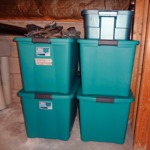
Changes to a home’s plumbing or lot drainage can help reduce the chance of flooding whether its your own home or your neighbours’.
It takes the entire community working together to make a positive impact on flooding. One person may be “just a drop in the bucket”, but collectively we can make a big difference.
The sewer lateral should be regularly maintained. Talk to a licensed plumber, who can carry out an assessment.
(The sewer lateral is the pipe that connects your homes’ internal plumbing to the sewer main in the street. It is a vital component of the system, and if it is blocked, or fails, your home will experience a sewage backup).
Never dispose of fats, oils, or greases down the drain or toilet.
DO place grease and food scraps into your Green Bin.You can absorb cooking fats, oils and greases using newspaper or paper towel, before placing it in your Green Bin. You can also use a cup made of 100 per cent paper, but we aware this could leak. Let all material solidify before you place it in your Green Bin.
Replace the tin can shown at left with a paper cup.
Tin cans cannot go in the Green Bin.
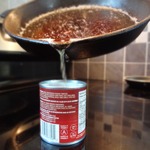
Speak directly to your insurer to find out if your policy protects you against sewage backups and water damage.
Learn what danger signs to look for and how to maintain your home’s drainage and plumbing. Talk to your plumber or your home inspector.
visit our Protect Your Home page
Installing or upgrading your sump pump may help prevent basement flooding in your home. Also, consider providing a backup power source for your sump pump.
visit our Sumps and Sump Pumps page
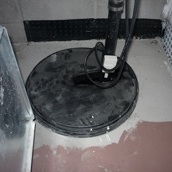
Sump pumps that connect directly to the sanitary sewer are illegal, by City By-law No. 2008-192. This sort of a connection puts you and your neighbour’s properties at risk.
Check out our infographic "Sump pumps: make the right connection" for all the details on making the right connection to protect your home.
When it’s raining heavily the sewers may fill up. Using a lot of water during heavy rains (for example, taking a shower or doing laundry) can contribute to basement flooding and overflows to your environment. Consider using less water in extreme weather situations.
Properly connected downspouts reduce flooding in your neighbourhood.
In most cases, the downspout should be draining over top of the lawn, at least two metres away from your house.
visit our Downspouts page
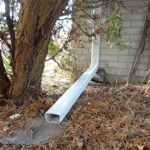
There are many natural ways to manage run-off on your property, including rain barrels, conservation gardens, proper sloping, and so on.
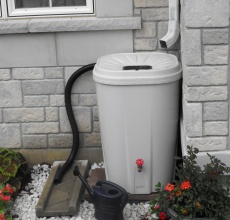

The chance of a basement flood increases when more groundwater sits around your foundation. Keeping the ground surface sloped away from your home is one way to reduce the water around the foundation. Consider redoing the landscaping around your house as it may settle over time.
Walk around your property when it rains to find the places where water may be getting into your home or where pooling water needs to be managed.
One common way for water to get into your basement is through cracks that may form as your home ages and settles. Maintain your foundation by sealing any cracks that may have formed and consider waterproofing the exterior walls.
visit our Protect Your Home page
Eavestroughs and downspouts that are clear of leaves and other debris are an essential part of helping rain water run safely away from your home and off of your property.
Installing and maintaining a backwater sanitary valve can help prevent basement flooding in your home. Follow the manufacturer’s recommendations for the type and frequency of maintenance.
visit our Backflow Prevention page
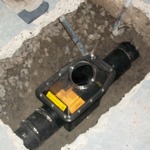
Keeping catch basins clear of debris will help prevent local flooding. If you see one that’s blocked with leaves or debris, we’d appreciate it if you could take a few moments to remove the blockage.
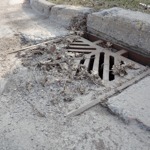
By-law 2008-192 is intended to help protect properties from flooding. Understanding and following the by-law is everyone’s responsibility.
More information on this by-law, including about fines and enforcement, is available on the City of Kingston website.
Find out more
To learn more about the projects Utilities Kingston are working on to address the problem of basement flooding, or if you have questions or concerns, contact us at info@utilitieskingston.com.
Customers can also contact us with any questions or concerns at 613-546-1181, Monday to Friday from 8 a.m. to 4:30 p.m.